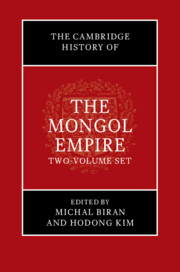Book contents
- The Cambridge History of the Mongol Empire
- The Cambridge History of the Mongol Empire
- Copyright page
- Dedication
- Contents
- Figures in Volume I
- Figures in Volume II
- Maps in Volume I
- Maps in Volume II
- Tables in Volume I
- Contributors to Volume I
- Contributors to Volume II
- Acknowledgments
- Notes on Dates and Transliterations
- Abbreviations
- Volume I
- Introduction
- Volume I Part 1 Political History
- Volume I Part 2 Thematic Histories
- Volume I Part 3 Views from the Edges
- Volume I Part 4 External Histories
- Epilogue
- Volume II
- Index to Volume I
- Index to Volume II
- References
Introduction
from Volume I
Published online by Cambridge University Press: 01 January 2024
- The Cambridge History of the Mongol Empire
- The Cambridge History of the Mongol Empire
- Copyright page
- Dedication
- Contents
- Figures in Volume I
- Figures in Volume II
- Maps in Volume I
- Maps in Volume II
- Tables in Volume I
- Contributors to Volume I
- Contributors to Volume II
- Acknowledgments
- Notes on Dates and Transliterations
- Abbreviations
- Volume I
- Introduction
- Volume I Part 1 Political History
- Volume I Part 2 Thematic Histories
- Volume I Part 3 Views from the Edges
- Volume I Part 4 External Histories
- Epilogue
- Volume II
- Index to Volume I
- Index to Volume II
- References
Summary
The Cambridge History of the Mongol Empire studies the Mongol Empire from a holistic point of view in its full Eurasian context, putting the Mongols and their nomadic culture at the center. It scrutinizes the Mongol Empire as a multifaceted phenomenon that combined elements from various Asian imperial traditions (steppe, Islamic, Iranian, and Sinitic empires) and created a common imperial culture – political, material, institutional – that has had a broad and enduring impact on world history. The two-volume set comprises a volume about history – political, thematic, regional, and external – and a volume devoted to sources on the empire – literary (in sixteen languages), archaeological, and visual.
The Introduction reviews the raison d’être behind this Cambridge History, its structure, and the state of the field in the study of the Mongol Empire. Finally, it commemorates two contributors, both leading Mongolists, who passed away in 2019, Thomas T. Allsen and David O. Morgan.
- Type
- Chapter
- Information
- The Cambridge History of the Mongol Empire , pp. 1 - 16Publisher: Cambridge University PressPrint publication year: 2023

